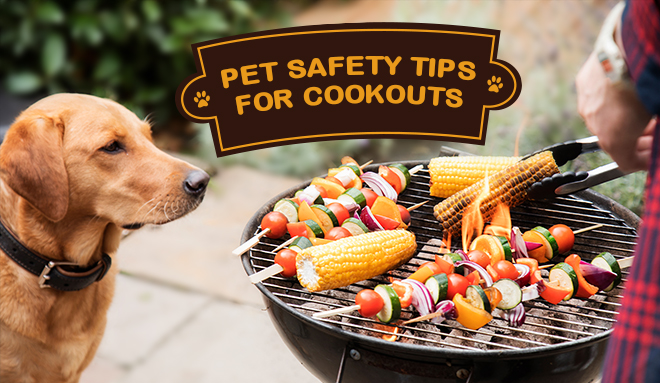It’s cookout time, so grab your aprons and light the grills, everyone! There is nothing better than enjoying a party with loved ones while dining al fresco, but we must keep our four-legged companions in mind. Since our pets are members of the family, most pet parents wish to involve them in family events and activities.
Many pets like the extra attention that visiting family members provide, and they can drool in anticipation of a juicy steak or burger that might slip off the grill by accident. But grilling and other cookout activities can be harmful to pets and result in burns, skin rashes, choking, and occasionally fatal gastrointestinal issues.

Consequently, to ensure the safety of your pet while allowing them to enjoy cookouts, check out the safety tips we’ve provided below to enjoy forthcoming outdoor celebrations with your pets while avoiding dangerous harmful exposures.
Keep your pet away from the grill
Both people and pets may find the mouthwatering aroma of fresh meats and vegetables sizzling on the grill to be alluring. An active grill, however, presents numerous risks for pets. According to the National Fire Prevention Association, pets should be kept at least three feet away from grills because the hot, dangerous flames and heat can burn their paws and cause their curious noses’ whiskers to catch fire.
As a result, never leave a grill that is in use alone. Also, make sure to keep pets from getting to the fat and meat trimmings that accumulate and become caught behind the grill. Rich, fatty foods can cause GI irritation, inflammation, or even potentially fatal pancreatitis in pets since they lack the enzymes needed to properly digest them.
Keep grilling equipment out of the pet-accessible area
For a grilling venture to be successful, numerous tools are needed. These tools or types of equipments, however, can harm animals. To prevent traumatic injuries from sharp edges or burned tongues in pets trying to taste your recipes, keep all grilling instruments, such as skewers and cooking tongs, out of reach of paws.
Additionally, to prevent ingesting, keep charcoal bag storage areas where pets are secure. Although charcoal is not poisonous to animals, it can nonetheless cause GI issues, choking, or obstructions that, in some instances, necessitate surgery. Store all plastic utensil and storage containers somewhere that pets cannot get them to avoid potentially dangerous ingestion.
Don’t feed your pet from your plate
We get that while you are preparing your BBQ feast, your pet’s hungry gaze and drooling muzzle may be difficult to ignore. However, a lot of common grilled ingredients, seasonings, and sides are harmful to pets and can cause GI inflammation, blockages that might need surgery, or even fatal toxicities.
If you suspect your pet has consumed poisonous food, call your veterinarian right away, and keep the Animal Poison Control number handy at all times.
Typical cookout food that endangers pets includes:
- Bones
- Raw Meats
- Hot dogs
- Garlic, onions, or other Allium family members
- Sauces, ketchup
- Corn cobs
- Snacks high in sodium, such as pretzels, chips, peanuts, and popcorn
- Sweets or chocolates
- Alcoholic beverages or alcohol-infused sweets
- Meals without sugar, like jello
Re-check the bug repellent and sunscreen prior applying to pets
A large number of biting insects, such as fleas, ticks, and mosquitoes, which can transmit diseases and parasites harmful to pets, are brought on by rising temperatures. When using bug spray on yourself or in the yard, keep your pet at a safe distance from you, and never use human-grade insecticides on pets.
The majority of commercial repellents have components that are harmful to animals. The safest, most reliable method to shield your pet from hitchhiking bugs is to use treatments for flea, tick, and heartworm prevention that have been known for animal use.
Make sure your pet can be identified
When relatives or friends arrive to share the bounty of your barbeque labour, it’s easy to get sidetracked. Make sure your pet is micro-chipped and sporting an additional form of identification, such as a collar or tag with embroidery.
As guests arrive, curious pets could unintentionally sneak out the front door. The only reliable, long-lasting way to identify your pet should they embark on an unforeseen journey is through a microchip. Always make sure the contact information on your pet’s microchip registration is updated.
Bottom line:
If your pets eat something they shouldn’t, keep a tight eye out for any symptoms of disease or distress, such as vomiting, diarrhea, breathing difficulties, lightheadedness, bloating, or a swollen mouth. Immediately get care from an emergency veterinarian if these or any other unexpected symptoms arise. It’s easy to take precautions to keep pets safe once you understand how harmful cookouts may be for them.

